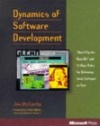Olivier Langlois's blog
Archives for: January 2008, 10
01/10/08
Dynamics of Software Development
I have not found this book as interesting as the type of books that I usually read. I prefer books dealing with the more technical aspects of software development. I have read this book because I need to acquire a solid base of knowledge on software project management and not because the topics covered in the book seemed fun and interesting to me. Even if I was not very enthusiast to read it, I must confess that the author made a great job making his book interesting to read by interleaving important concepts with anecdotes from his work experience.
This book is divided into 54 short advices each taking 1 to few pages to expand the rational behind the advice. This is a format that I like and the advices that I have preferred were the ones dealing with the psychological aspect of software development. An example of such rule is that software quality is the mirror of the state of mind of the team. For some this might be obvious but considering the book intended readers which consist of engineers and software professionals, the author has been wise to be explicit on this topic in my opinion as from experience, human interactions is usually not the strongest skill among developers.
The part that seems to me to be outdated is the whole proposed economical model to market software. The author advocates that to make money from software, you must release often like every year and by doing so, your customers will be so happy that they will gladly hand you more money year after year. I think this model used to be true when the software industry was still young 20 years ago but in 2008, the software products are so mature that no matter how hard you try to squeeze more new features, it will not be enough to justify for people to purchase the new version when that last one does everything you want. You just have to think about the sales of Windows Vista or Microsoft Office 2007 to see what I mean. Changing just for the sake of changing does not sell.
In my opinion this model should be changed to one where incremental small evolutions are proposed to customers. I would be willing to pay a small amount of money every year for an OS that is smaller, better and faster at each version. I do not get it how software companies can expect people to be interested in slower and more bloated products than the previous version. Add the possibility to purchase inexpensive add-ons to fill very specific needs to the model and you have a very attractive model. I am not sure if what I would like to see is representative to what the typical customer expects or if my proposal is viable in real life but one thing is sure. The model proposed in the book does not seem to work anymore for many mature businesses.
There is a 2006 edition of this book. I might take a look in it to find out if the advices that I have found outdated have been reworked.
Olivier Langlois's blog
I want you to find in this blog informations about C++ programming that I had a hard time to find in the first place on the web.
| Sun | Mon | Tue | Wed | Thu | Fri | Sat |
|---|---|---|---|---|---|---|
| << < | Current | > >> | ||||
| 1 | 2 | 3 | 4 | 5 | ||
| 6 | 7 | 8 | 9 | 10 | 11 | 12 |
| 13 | 14 | 15 | 16 | 17 | 18 | 19 |
| 20 | 21 | 22 | 23 | 24 | 25 | 26 |
| 27 | 28 | 29 | 30 | 31 | ||
Search

Categories
Olivier Langlois's blog
- AAC (2)
- Book reviews (12)
- C++ (24)
- Code Optimization (4)
- Compiler (3)
- Fractal (2)
- Linux/UNIX (3)
- Multithreading (3)
- Software security (7)
- TCP/IP (8)
- Web (1)
- Windows programming (19)
- C++ (28)
- tutorials (4)
- General (10)
- Hardware reviews (2)
- Linux (12)
- Recommended books (4)
- C++ (20)
- Code Optimization (2)
- Compiler (3)
- Fractal (2)
- Linux/UNIX (1)
- Multithreading (2)
- Rare out of print (3)
- Software security (5)
- TCP/IP (7)
- Windows programming (16)
- Software reviews (0)
- TCP/IP (8)
- Video games (4)
Archives
- January 2016 (1)
- September 2015 (1)
- July 2015 (1)
- June 2015 (1)
- May 2015 (1)
- December 2013 (3)
- September 2013 (1)
- May 2013 (8)
- April 2013 (1)
- December 2010 (1)
- August 2010 (1)
- June 2010 (1)
- More...
Misc
 XML Feeds
XML Feeds
What is RSS?
Who's Online?
- Guest Users: 7
 BOOKS i'm reading
BOOKS i'm reading




